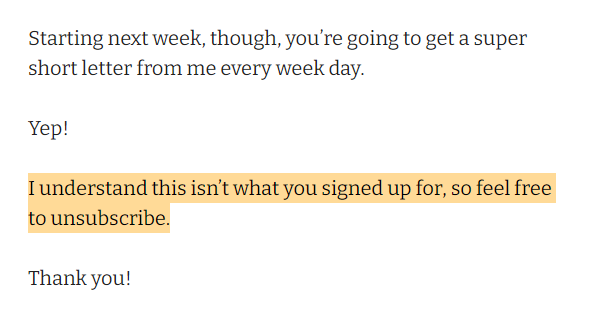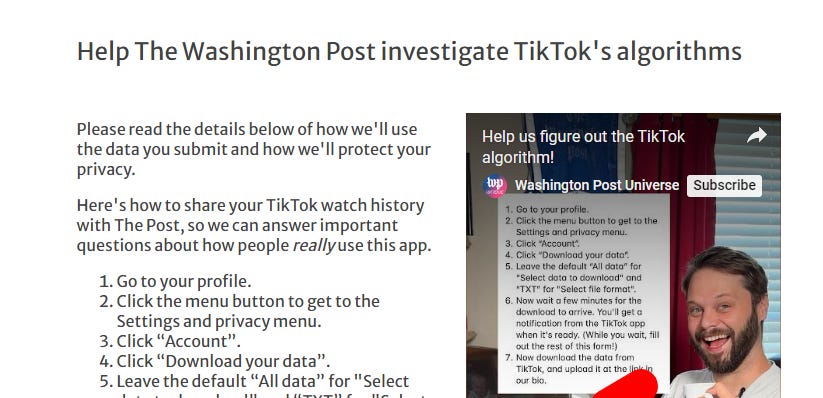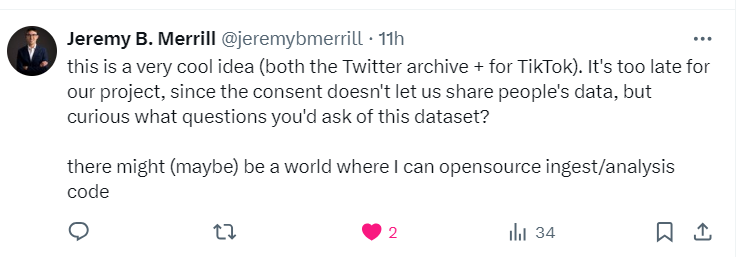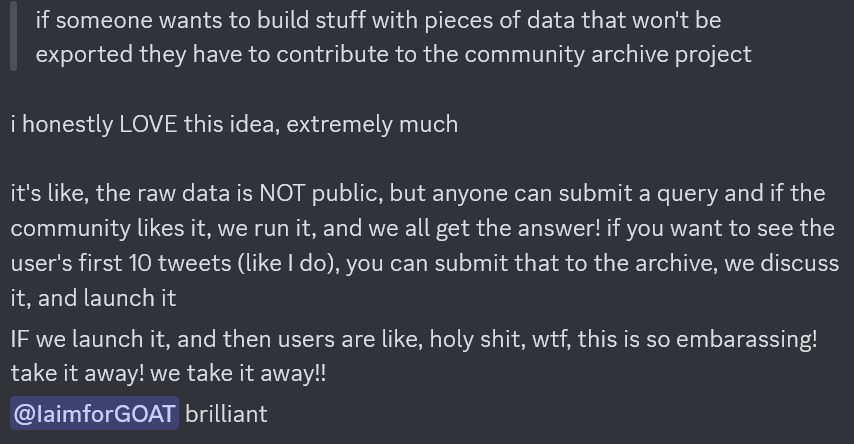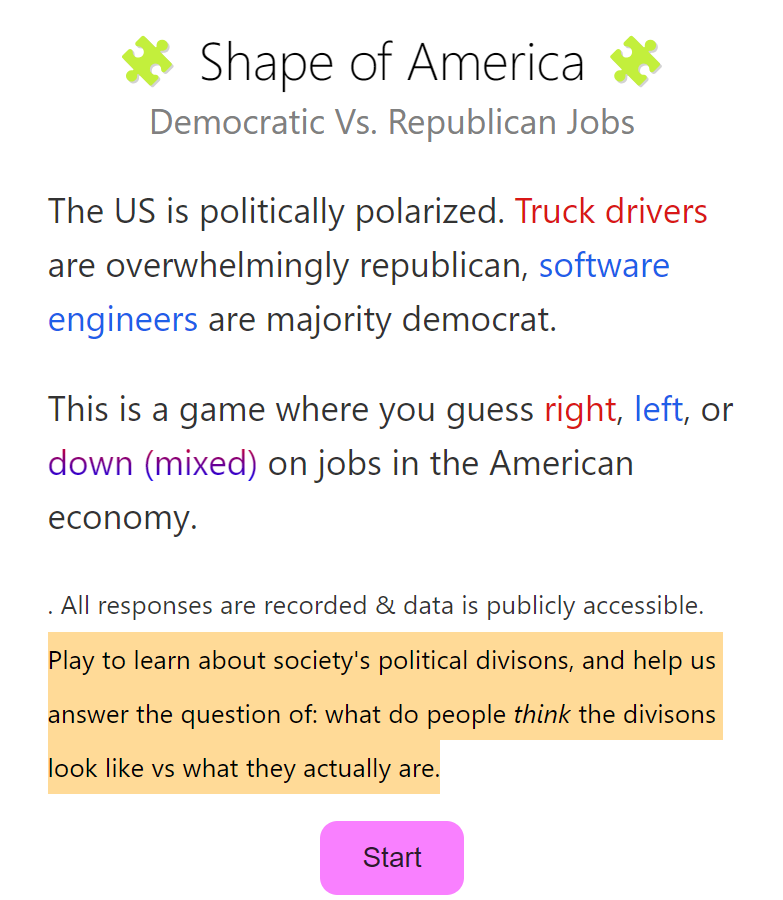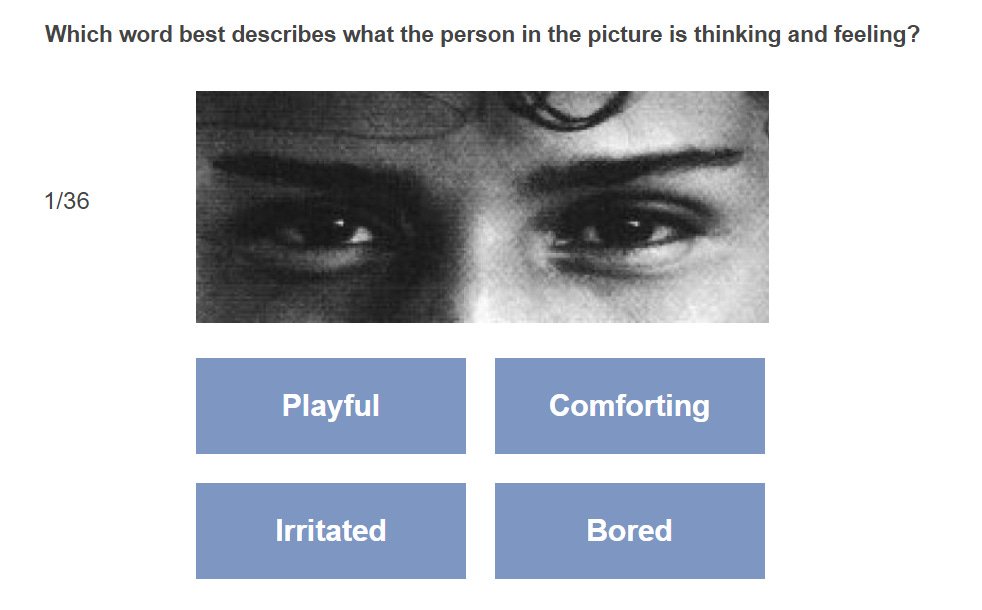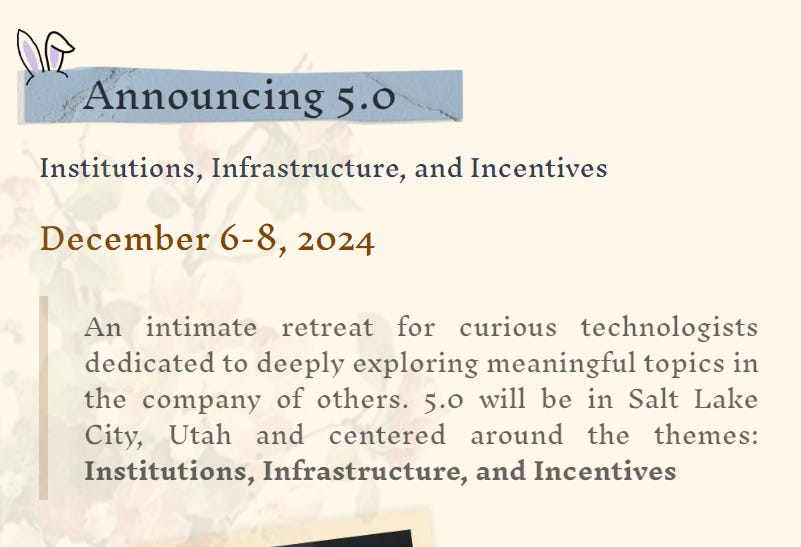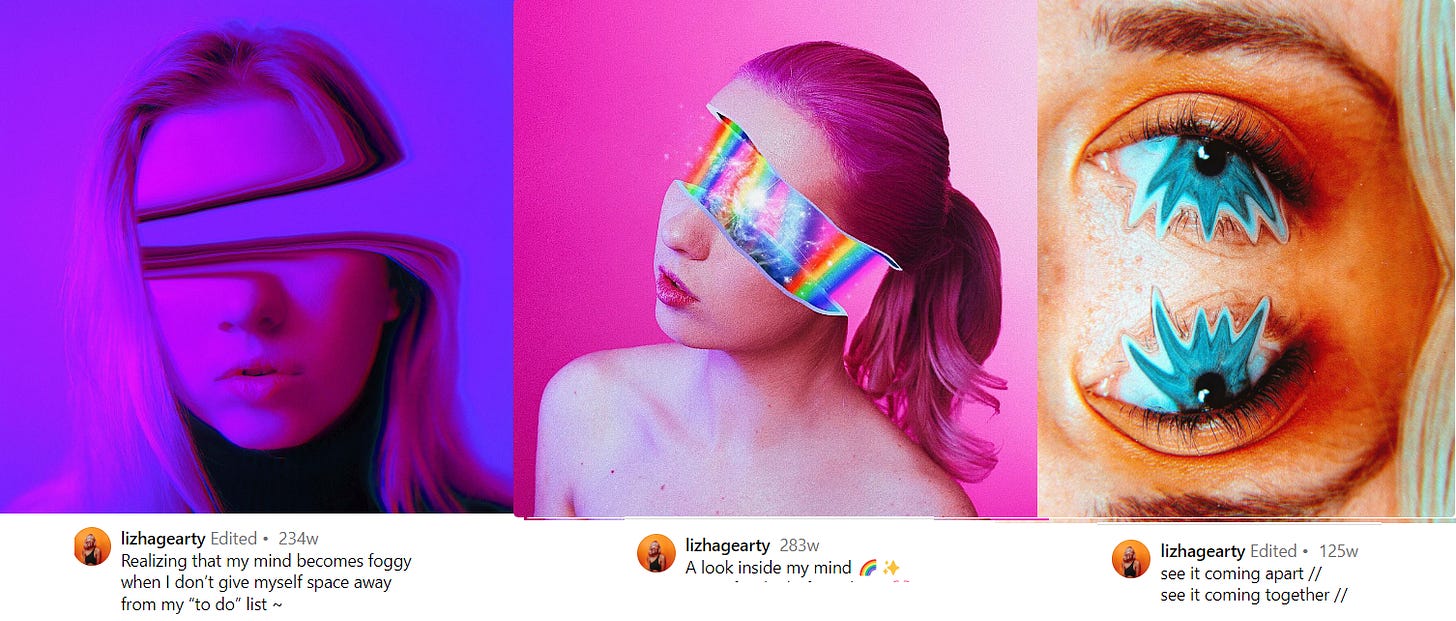Writing devblog #1 - communal science, open data & the necessity of beauty
I've always had devblogs for my code, here's one for my prose
I’ve been really enjoying Ray Doraisamy’s newsletter format: daily, super short, one paragraph or two. It doesn’t feel like a burden to read & the ideas are fascinating.
I feel like I’ve been stuck writing just one form of content (long, evergreen essays), but I need more than this. I need a space to just write about what I’m currently trying to do and get feedback. And, apparently, I can just do that?? I love Ray’s announcement:
This may be long & windy, but I’m using copious headings so you can skip sections!!
What is a writing devblog?
It’s just like a normal software development blog, sharing updates on what’s working & where I’m stuck, except the thing I’m producing is writing. Yes, we’re writing about writing! Sounds familiar!
It’s very on-brand for me because my whole book idea was that I would write about the world I wanted to create for myself, and in doing so make it happen. But I am stuck on that!!! So how do I get unstuck? Write about what I’m stuck on & how I’m going to fix it (and I’ll either do it or you, dear reader, will help me out/take the idea and run with it). That’s it, that’s the whole game! We keep doing this recursively. When stuck, we retreat down the stack frame (smaller tasks & goals), when it’s going well, move up the stack frame (like zooming out in google maps).
The reason this is very good for me is because my brain doesn’t work with one topic at a time. My creativity & inspiration comes in waves, and it’s very high-breadth. Instead of trying to shove it into one pinhole I will just put out as many cups as I can and fill them incrementally. I’ll orbit around the same ideas over & over and extract evergreen essays from the stream of life.
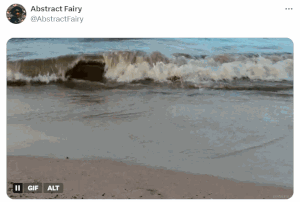
“Twitter shut off the API; but they can’t stop us from sharing our own data with each other”
I wrote an article about this idea that we can just collect our own twitter data and make an open API, and my vision for what I hope to happen next. It got on the front page of HackerNews with lots of great (highly skeptical) discussion.
I think it’s awesome. Everyone on twitter was super positive about the idea, which is great, but we lacked critical feedback. Hearing all the criticisms made my conviction grow even stronger. Everyone agrees that there is a problem, and we’re arguing over the best way to fix it. A large part of the skepticism is a lack of faith in the average person. I think that’s where I really shine.
I think society has a ton of easy solutions for many things that no one is even trying because people have such little faith in their fellow human. In this case, it’s how much value you can get just by ASKING users for their data instead of trying to trick & coerce them.
I felt extremely validated when
showed me that the Washington Post is currently DOING EXACTLY THIS (tweeted this here)Here’s a data journalist from WaPo asking us what WE would do with the data, and they can try to answer our questions/run the analysis etc!!!
See, this is it! It’s not about collecting data in yet another centralized pot. It’s about the public being curious, wanting to know things that people in closed rooms already know about us. And the research will happen IF and ONLY IF users consent to it, and want it. People WANT to know how the TikTok algorithm works, and also if their viewing habits are weird/similar to others etc.
Also, you don’t need to be in charge of this study/have this data, if you have questions, the WaPo is literally right there, you can ask them, make suggestions. If it’s (1) a really good question (2) that many users want to know the answer to, they will totally do it! It’s good for them, publicity, it’s good for users, it’s win-win for society.
I want to quote tweet this and ask people for suggestions. I don’t actually use TikTok that much, so I don’t have many insightful questions, but I WANT users to suggest things. I want people to get involved, because people ARE curious. The reason they’re not engaging is because they think the people in power don’t care. BUT THE PEOPLE IN POWER ARE STRUGGLING to figure out what people actually want. Does no one else see this??? This is happening everywhere in society.
Some people in the community archive discord are getting cold feet about whether it’s a good idea to keep the data fully public or not. Someone suggested: why not private data but public analysis? I think this is brilliant and how it should be. Again, it’s not about one entity controlling user data. It’s about: if people really want something to happen, THEY can make it happen, even if it means exporting all their data and making a new collection for the purpose of answering a specific question.
I think what I want do next here is go back to focusing on what made me excited about this in the first place: exploring my own archive semantically, getting data from people I interact with regularly, mapping out our shared history & learning new things about each other. A lot of this is difficult for scalability reasons in the full archive, but I can do it on my own data, and add my friends data to it, and open source the tools as I go.
Shape of America - political quiz game
I feel like many amazing people write a lot of amazing things, but one area that not many people are working on is open source experiments about society & culture. And I can work on this.
The idea is to make these games that inherently fun, AND they also happen to teach you something valuable AND by playing you contribute to an open science experiment, to data that is public and that YOU or anyone else can use.
I love participating in academic studies, but I haaaaaaaaaaaaaaaate it when they don’t share the data. I always ask, “can you show me when the paper is done? since I am being studied, I’d like to read about the conclusions of this work”. “Oh of course! Definitely!” I never hear back.
This is not excusable. People tell me, “oh well you know, these things take months or years, they probably just forgot”, well yes, they did forget! It’s not important for them, they don’t see the people they’re studying as participants in science. They are objects of study. If they were leveling with me they would just say, “oh yeah, this is the name of the lab, it’ll probably be published in this journal” or “you can follow me/our lab on twitter, we tweet about new papers we publish!”
The public doesn’t trust science, because the scientists don’t respect the public. They think the public is stupid. But that’s a myth, Feynman warned against believing in this myth.
Anyway, I’m trying to show *I* would do it, starting with this little political quiz game:
I think my goals are:
make people curious about the other political side
& nudge you to update your mental model if you have strong bias, because you’ll just be bad at this game
collect data about these biases (how different are the results of each party? what does each party THINK the other party looks like?)
meta goal: create a template/example for more open science / culture experiments like this
I think this is also part of a movement, not my original creation, which is great. I’m not working alone, I’m building on the work of a culture. That means we can go further, AND there’s much work to be done (and a place for you dear reader if you’re interested).
There are two examples I was inspired by, this test about how good you are at reading emotion through eye contact. This was made by a real academic, Professor Simon Baron-Cohen.
And “is my blue your blue”, testing people’s language for shades of colors, also made by a real academic (although this app is NOT itself part of an academic), this one has source code on GitHub.
I think both of these still miss the mark of “user data ownership”. I don’t know if I’ll hit that ideal with my first app, but what I REALLY want to support is:
do this experiment on yourself, learn about yourself (& contribute data)
share it with friends, and have the ability to collect THEIR data
the raw data, I want *you* to be able to see, who’s the best at this amongst your friends, who’s the worst, and talk about it. It’s YOU studying YOUR friends & each other, not the ivy tower from above studying you
tweak it
“tweak it” is very important for me. Right now you can technically do this, fork the thing, deploy it yourself. It’s a lot of work, but it’s at least possible, and if people want it enough, they’ll do it. I’m trying to set up mine so that deploying your own version is as easy as forking the GitHub repo (it’s published on GitHub pages, and even if you don’t have a backend, you can have people email you their data or something, the app lets users export it).
I think “tweak it” is very important because researchers CANNOT anticipate every possible scenario and nuance in every culture. I think the reason a lot of cultural studies fail is because the researcher is too far from the subject. It’s hard to get closer without it being invasive. I think we should go the other way, just let people remix the studies and run them on themselves and they will learn cool stuff and report back.
The necessity of beauty
Alright, so that’s what I’m working on. I’ve been pretty miserable though. Part of it is not sleeping well (partially due to being excited about all the things…) I think another part is I keep forgetting why I’m doing any of this in the first place.
I think it’s about making something beautiful experiencing beauty.
I filled out an application for this “rabbithole retreat” organized by
& friends. My favorite part about the application was them asking for recommendations. It felt so good because it gave me an excuse to indulge in things I love & why I love them.I talked about James Burke’s “Connections” documentary series & “Fall of Civilizations” youtube channel, both making me fall in love with history. I shared the song Record Player by Daisy The Great.
I talked about my love of Liz Hagearty’s aesthetic. She's a software engineer turned artist who creates these strikingly beautiful surreal pictures of herself.
I think what I love about the aesthetic is this feeling of high tech, but extremely human? It’s retro in feel but very futuristic in execution. I get the same feeling from the “Record Player” song.




